
Supporting Palliative Care in Africa: Francophone Initiators at Mulago Hospital
![]() Hannah Ikong
Hannah Ikong
![]() 31st January 2023
31st January 2023
We are always keen to support palliative care education and training, especially regarding palliative care integration in the national health systems. Our partner the Palliative care Education and Research Consortium (PcERC) has accomplished quite a bit of this health system integration in Mulago and Kiruddu Hospitals of Kampala, Uganda and they provide good examples of what can be done in the Sub-Saharan Africa (SSA) context.
We were quite pleased to welcome a group of visiting Francophone health care professionals, from all over Africa –Congo, Cote D’Ivoire, Senegal, Togo among others – and even from Haiti. They visited Mulago Hospital with our partner PcERC last week on January 25th. These professionals were attending a course at the Institute of Hospice and Palliative Care in Africa, which most of you may know as Hospice Africa Uganda (HAU).
For many of the visiting health care professionals and leaders, seeing a palliative care unit work inside the hospital system was a concept only discussed in textbooks. All were encouraged to see how palliative care can be incorporated within the government hospital.
One method included LINK nurse trainings, where nurses are trained to take care of some palliative care needs while referring complex needs to PcERC. Another current integration involves rotating intern doctors and SHOs who take turns to partner with the unit and grow their skills in palliative medicine while they are there.
Mutual learning also happened during the visit to Mulago Hospital. After spending time on the ward in small groups, we gathered together to debrief and to understand what was happening with each patient and how the palliative care unit could work with hospital staff and family caregivers to improve care.
Dr Mhoira Leng spoke on integrating palliative care -- leaving none behind -- and one of the key concepts was the transformative power of palliative care. With value-based care, she introduced the topic, you are "promoting dignity, relieving suffering, demonstrating compassion, [and] fighting for justice."
This set the theme for the presentation, from palliative care in fragile settings, to our planetary health, to the challenges that have been overcome in the Kampala governement hospitals to bringing palliative care to all.
Of course, the visit with the Francophone health care professionals came with a twist: translation! We had several visiting French to English translators, and some on the Cairdeas and PcERC team took time to practice their basic French skills.
As I was watching the interactions, I was touched by how the work for quality, accessible and integrated palliative care transcended culture, country, and even language. From ward rounds to the post-ward round discussion and presentation on transformative palliative care from Dr Mhoira Leng, it was clear that compassionate and holistic care was important to all involved.
To our new colleagues and friends part of the Francophone class at Institute of Hospice and Palliative Care in Africa, we are pleased and proud to be working with you in establishing palliative care in each of your respective communities.
As declared on the t-shirts of the group, “I support palliative care in Africa.” Je soutiens les soins palliatifs en Afrique. Let’s continue the good work of palliative care provision and integrated services.
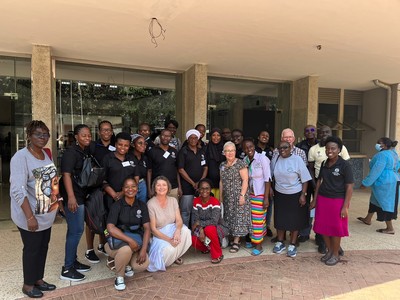
Meet the group of Francophone Initiators, translators, Hospice Africa Uganda leadership with the PcERC and Cairdeas teams.
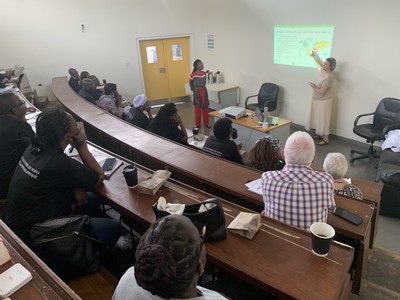
Dr Mhoira Leng speaks on the fragile, conflict-affected and vulnerable settings around the world and we can integrate palliative care.
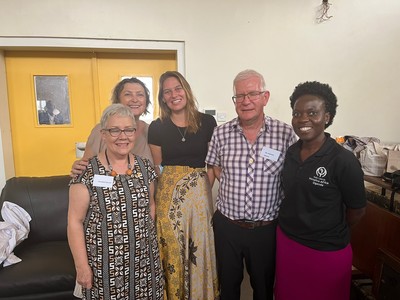
Leadership from Cairdeas and Hospice Africa Uganda: Heather Miller stands to the left with Dr Mhoira Leng, one of our translators Daisy, with Dr Stephen Miller and Dianah Basirika.
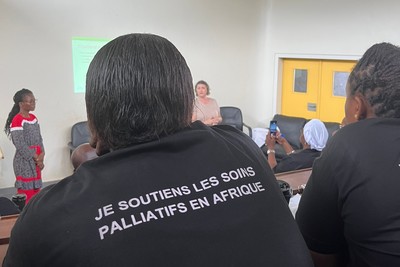
Proudly wearing "I support palliative care in Africa." We at Cairdeas can't agree more!
“I wish palliative care could be like malaria.”
![]() Hannah Ikong
Hannah Ikong
![]() 26th January 2023
26th January 2023
– Simon Maku, clinical officer, volunteering in Peace Hospice Adjumani (PEACHOA), Uganda.
This was the first time Simon Maku ever completed a Needs Assessment, a type of data collection tool to determine the exact medical and social conditions of those living with palliative care needs in a certain area. It was also my first Needs Assessment in rural Northern Uganda, and I learned quite a bit with the traveling medical team and community-based Village Health Teams (VHTs).
Our traveling team of five included Dr Mhoira Leng, in addition to Vicky Opia, Godfrey Oziti and Simon Maku from PEACHOA, and Toko Friday and myself from the Palliative care Education and Research Consortium (PcERC). We were very happy to work with a team of thirteen VHT mentors and VHTs, who connected us to each individual and family and often served as translators.
You might be wondering what is involved in a Needs Assessment? Of course, we are to collect data, but there’s something to be said on how it is completed and its connection to the bigger picture of developing quality palliative care for all. Our recent one was in Obongi district of Northern Uganda from the 5th to 8th of January when it was not too hot (nor rainy).
The data collection work started weeks in advance with the support from our administrative teams and Godfrey, who did an excellent job coordinating the VHT Mentors and VHTs. From our records, in some three villages in Obongi district (Dama, Bongilo, and Pasu), there was 126 individuals identified in advance by the VHT Mentors and VHTs with possible palliative care needs. With much teamwork and effort, we visited 117 of these individuals in their own homes.
Let me just pause for a moment: over a 4-day period we met and screened 117 people (almost 30 a day!) for palliative care needs. And even if they did not have a chronic, serious illness, we always took a moment to listen and counsel, share medical advice, and perhaps write a referral to a nearby health centre for further investigations and care. Those who did have palliative care needs were given a more detailed assessment, often with a lot of translation support, and some 81 individuals were then recruited to the Needs Assessment study.
Yet this was more than “a study,” I felt many times during the trip, this was getting to know each individual as a person, not a patient. Some spoke about their children who have died, or their husbands out of country. Others did not speak much but created beauty with artwork on the walls and maintaining beautiful, trimmed hedges around their home that spoke of better times. There was also a lack of food (tight rations) and eating one meal a day could be struggle.
One particular gentleman I visited with Toko Friday was a retired teacher from South Sudan. In addition to having cancer of the throat, he had others issues with his refugee status, which greatly affected the care he could receive at local and national health centres. Thankfully our team was to connect with those who handle refugee statuses as well as look into what kind of oncology support that he could receive, and we know that the VHT Mentors and VHTs will continue to liaise with and support him.
I found the Needs Assessment trip to be the bridge between the deep connection of humanity and suffering and the call for health system changes.
One moment, we were meeting one-on-one with someone like the retired teacher who had many levels of need but couldn’t stop smiling and cracking a joke or two about oncology doctors, while other times we sat with worried family, who had many questions for us, including inquiries about getting a wheelchair for their child who has a complex disability.
We saw the needs in the data collection even: initial findings report that a third had neurological conditions (acquired brain injury, complex and learning disabilities, Parkinson’s, etc.) with many others live with HIV/AIDS and musculoskeletal or chronic pain. These serious, chronic illnesses took a toll on the individual and their family, with high levels of distress reported, as well as the inability to work or perform daily tasks.
Our advocacy has begun to make palliative care as common as malaria. Even during our trip, we shared our Needs Assessment work and initial findings with the Obongi District Health Official (DHO) Mr Dominic Lomurecu.
Mr Lomurecu was already aware of and supported our activities, recognising the need for quality, accessible palliative care in Obongi district. He was in favour for more training of palliative care in Northern Uganda, which included communicating to other stakeholders about the unmet needs and how we all can integrate palliative care in all the health services.
Readily identified and accessible care, with widespread education and desensitisation from the healthcare workers to VHTs to the family caregivers, is a global palliative care need. Just as outbreaks of malaria demand a response from various organisations – i.e., to control the mosquito population, provide care for the ill, and educate the community – so does the need for palliative care must be met by many stakeholders in multiple levels.
And our time of Needs Assessment in places like Bongilo, Dama, and Pasu villages in Northern Uganda did confirm quite several unmet palliative care and psychosocial needs.
Please stay tuned for further updates in this work of creating quality, accessible palliative care. We will be sharing more blogs soon about the VHT Mentors and VHTs and how it is to live in fragile setting with palliative care needs.
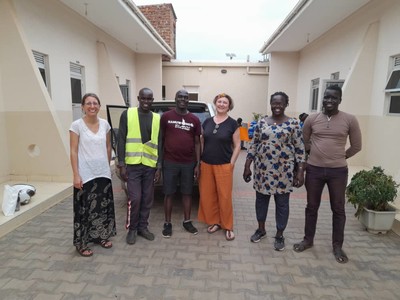
The start of the Needs Assessment: the traveling team has just reached Obongi town after a 12-hour trip from Kampala, Uganda.
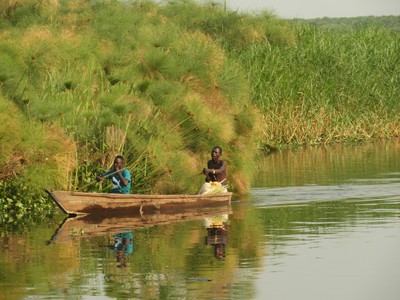
Snapshot of the Nile River, which divides Obongi district from Adjumani district.
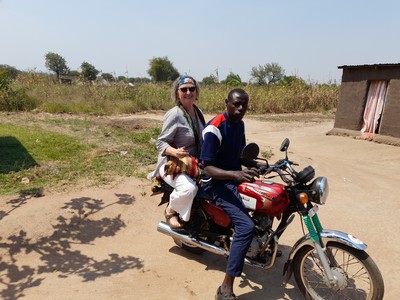
Screening individuals for the Needs Assessment is an all-day process. Dr Mhoira hence took to a motorbike (boda boda) with driver Emma.
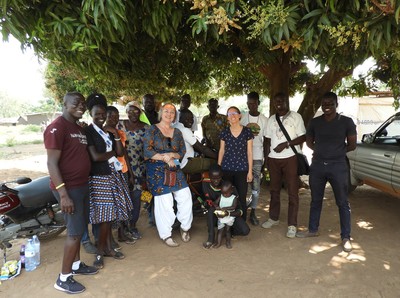
VHT mentors, VHTs, boda boda drivers, PEACHOA, PcERC and Cairdeas all played a role in the data collection, pictured here in Pasu village.
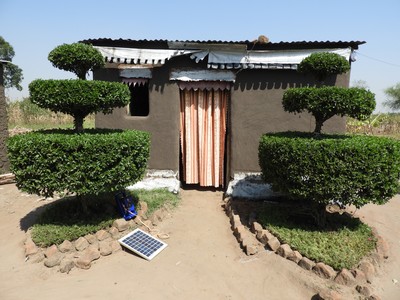
Getting to know the person behind the diagnosis: for one individual, she showed off her beautiful trimmed topiary.
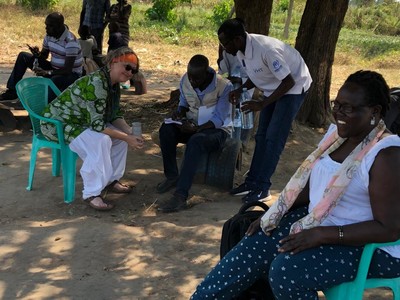
A quick break of the whole team under a grove of trees: connections were built within the team as well as within the community.
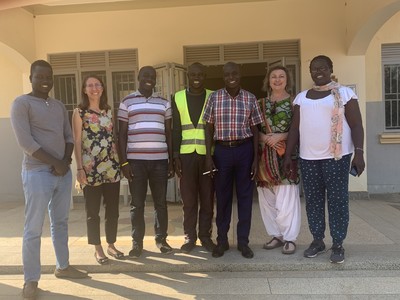
Pleased to stand with Mr Dominic Lomurecu, the DHO of Obongi district and a strong advocate for palliative care. Pictured left to right: Simon Maku, Hannah Ikong, Toko Friday Santiago, Godfrey Oziti, Mr Dominic Lomurecu, Dr Mhoira Leng, and Vicky Opia.
End of Year Reflections and Ways to Give
![]() Hannah Ikong
Hannah Ikong
![]() 16th November 2022
16th November 2022
For almost two decades, Cairdeas has endeavoured to support quality, accessible palliative care in resource-limited areas around the world. Cairdeas began with friends and colleagues in 2005 and soon grew to hold a mutual vision to work alongside existing and emerging palliative care services:
- supporting education, training and curriculum development
- offering specific clinical expertise, such as mentoring and service design
- and, raising the profile of palliative care needs.
A Scottish Gaelic word, “Cairdeas” means worldwide friendship, and in this year of 2022 we couldn’t agree more. Our friends, colleagues, individual and organisational partners throughout the globe are foundational to our vision where palliative care is accessible by all.
We thank you for your giving of time, talents, and resources over the years. From the recent difficulties of navigating the COVID-19 pandemic to the milestones of beginning the Cairdeas mission, expanding to places like India, Uganda, the Sahara and Gaza, we have been grateful to walk step by step alongside you.
We also celebrate our achievements together in providing excellent palliative care for all. From our early years of mutual growth of Pallium India and Christian Medical College, Vellore, to the leadership development of a new palliative care unit in Mulago Hospital and Makerere University in Kampala, Uganda (MPCU), we are honoured and proud of the progress we have made together.
This year, as MPCU makes 14 years of service and now operates in both Mulago and Kiruddu Hospitals, we are also partnering with the Islamic University in Gaza to establish a diploma programme for palliative care. (More information to come!)
We are thankful for what we have accomplished together and are eager to see what the next years have in store. We invite you to draw close and interact in this journey of quality palliative care for all, as we suggest the following:
Stay connected to new happenings. You can register to be notified of new blogs or follow our social media pages on Facebook and Twitter.
Purchase picturesque calendars. For those in the UK only – limited time only – Stewart Kerr has offered beautiful sceneries of Scotland, with all proceeds going to Cairdeas.
Stewart shared:
I am fundraising again this year for Cairdeas International Palliative Care Trust with a new Scottish landscape calendar for 2023. The format is the same as last year. They are A3 in size (297 x 420 mm) on 250gsm coated stock. They are available at £14 each plus £2.50 UK postage if required (plus any additional donation you care to make) with ALL money going to Cairdeas.
If you would like to order any, please just get in touch either directly or using the email below letting me know how many you would like and an address if you would like them posted … Email: calendars@stewartkerr.com
Shop online and give to Cairdeas. Register on Amazon Smile, Give as You Live, or Easy Fundraising, where a percentage of your online purchases will automatically be donated to us.
Consider volunteering with partners, PallCHASE or PcERC. Simply send a quick email to our global partner PallCHASE (Palliative Care in Humanitarian Aid Situations and Emergencies) or to PcERC (Palliative care Education and Research Consortium) in Kampala, Uganda.
Donate for long-lasting impact. Giving at Cairdeas goes towards building capacity for village health teams and healthcare workers, or you can contribute towards the Cairdeas Scholarships programme to sponsor a year-long diploma or three-year degree in palliative medicine. You can donate to Cairdeas directly or give to PcERC’s Global Giving page.
Thank you for extending worldwide friendship and fellowship, Cairdeas, to the areas that need palliative care services the most. With each patient and family provided with holistic care and with every healthcare worker trained, we advance the mission to promote and facilitate the provision of high-quality palliative care to all.
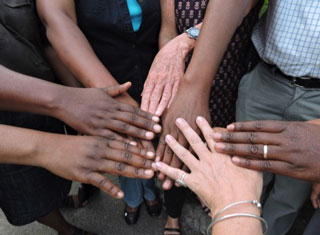
Cairdeas: Worldwide friendship or fellowship.
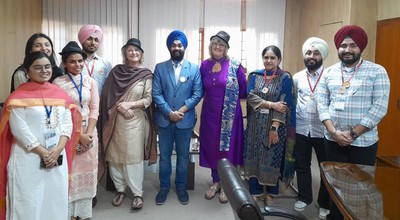
The “Hats on for Children’s Palliative Care” day of 14th October coincided with the Palliative Care Conference at the Sri Guru Ram Das University of Health Sciences, Amritsar, India.
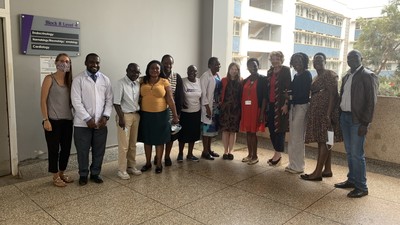
The MPCU / PcERC team fills the frame at their Clinical Office 4B at Mulago Hospital.

Sneak preview of the 2023 Calendar for Cairdeas fundraiser … make your order today!
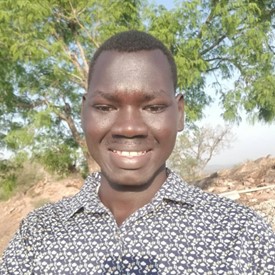
Current Cairdeas Scholar Phillip Amol Kuol gives a quick smile after taking a call from his mother in South Sudan. Phillip is studying social work and social administration and serves in a Village Health Team (VHT) in Adjumani, Uganda.

As our year comes to an end, another one begins … let us enter 2023 together.
